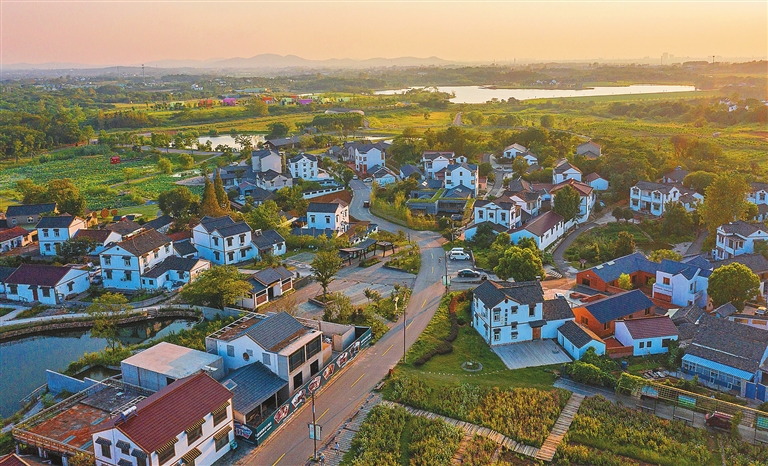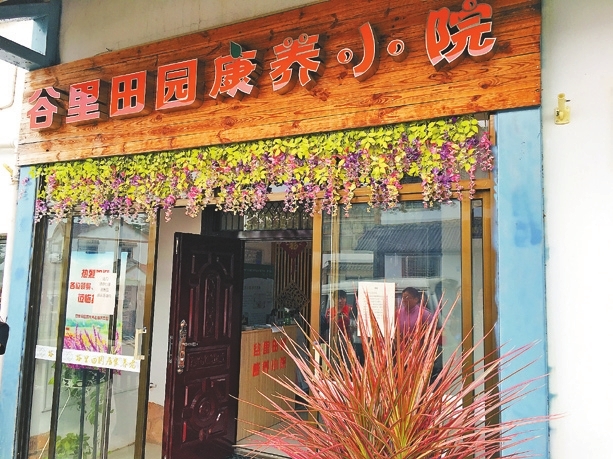


Zhang Yu JeniZhang13@163.com AS renowned Chinese poet Bai Juyi once said in his poem “Recalling Jiangnan,” “Fair southern shore, with scenes I adore,” the Jiangnan region, a geographic area in China referring to lands immediately to the south of the lower reaches of the Yangtze River, has long been eulogized by men of letters for its picturesque scenery. As cooler air and colorful leaves encourage us to welcome autumn, a media delegation formed by reporters from the Guangdong-Hong Kong-Macao Greater Bay Area was recently invited to the Jiangning District of Nanjing, the capital city of Jiangsu Province, to witness the district’s achievements in ecological advances, technological innovation, public services and rural revitalization. The district’s phased achievements echo one of China’s two centennial goals, that is, to complete the building this year of a moderately prosperous society in all respects. Jiangning is located in the south central part of Nanjing, encircling the downtown of Nanjing from southeast to west, with an area of 1,561 square kilometers and a permanent population of 1.18 million. In recent years, Jiangning District has won a number of national titles by virtue of its profound cultural heritage, superior regional transportation, beautiful ecological environment, strong economic strength and rich scientific and educational resources. In 2019, Jiangning District took the fourth spot among the top 100 Chinese urban districts in terms of comprehensive strength. Jiangning Development Zone ranked seventh among national economic development zones. Rural revitalization In Xujiayuan Village in the Guli Subdistrict of Jiangning District, the countryside is dotted with crisscrossed flower fields, and a wild profusion of vegetation on the mountains faraway. Unlike a stereotypical Chinese rural village, Xujiayuan Village, housing 43 households, bears a passing resemblance to European towns and villages. According to the subdistrict, since becoming the first batch of characteristic rural villages in Jiangsu Province in 2017, Xujiayuan has formulated a set of development goals and specifically invited the Department of Urban Planning and Design of Nanjing University to help renovate old village houses. In light of local resources, history and culture, Xujiayuan nailed down a development plan that highlights improving the ecological environment and integrating its history and culture into rural space construction and rural society. Sensing the business opportunities for village tourism, Ma Chao, of the post-1980 generation, has returned to his hometown and opened a hostel in Xujiayuan. Ma’s hostel, called Xujiayuan Ruogu Hostel, is rebuilt from an old farmhouse. According to Ma, the hostel has seven buildings and 35 guestrooms, which can accommodate nearly 100 tourists. The trial operation started in June last year, and the local government has given a lot of preferential policies to support the operation of hostels. Having earned a good reputation in the surrounding areas, Ma’s hostel is almost always fully booked during holidays. The Guli Tianyuan Elderly Care Service Center, located in the same community of the subdistrict, has a number of courtyard houses and centralized elderly care service facilities. In partnership with the Jiangsu Province Geriatric Hospital, the center is funded in and constructed by the Guli Subdistrict. The center integrates elderly care, health management, TCM health care, medical treatment, rehabilitation, leisure and entertainment. People’s ‘vegetable basket’ As the only agricultural product wholesale market in Nanjing, the Nanjing Logistics Center of Agriculture Byproduct located in Jiangning District strives to ensure the safety and quality of the local people’s “vegetable basket.” The total construction area of the center is 1.5 million square meters, with various business facilities covering 1.1 million square meters. The center houses eight professional markets for vegetables, fruits, aquatic products, meat, nonstaple foods, general merchandise, grain and oil, and hotel supplies, with more than 400,000 kinds of trading varieties. According to Yuan Jincheng, secretary of the discipline inspection commission of the center, the logistics center has taken the lead in the country in establishing a three-pronged supply guarantee mechanism, namely, ensuring supply in the warehouse, ensuring supply in the field and entrusting urgent transportation. “The center is able to provide an annual vegetable supply of over 3,000 tons,” said Yuan. Meanwhile, the center has reduced or exempted more than 80 million yuan (US$11.74 million) of market stall fees and water and electricity charges to relieve the burden on businesses, and has implemented a two-level management system for the access of agricultural products and laboratory testing. After 11 years of development, the center has become the largest fruit trading venue in China, said Yuan. During the COVID-19 epidemic, the center took actions in a timely manner to ensure the supply of foods, which helped it win the trust and praise of the public. Internet+nursing The Internet+nursing platform called Xiaojiang Jiahu has become a resource for active exploration of Jiangning District to optimize elderly care service. According to Wang Jindong, deputy head of the district’s civil affairs bureau, there are nearly 20,000 elderly people aged over 80 in the district, and the elderly over 60 years old account for more than 22 percent of the total population in Jiangning. “The investment in the construction of a 1,000-bed nursing home requires 1.2 billion yuan. Obviously, it is difficult for the government to bear the heavy burden, so it is urgent to explore new models of home-based elderly care,” Wang said. Jiangning District launched the Xiaojiang Jiahu home-based elderly care service project in November 2017, with the aim of providing a series of diversified closed-loop elderly care services for the elderly, the disabled and minors. The project also offers professional on-demand door-to-door services for the elderly aged over 80 throughout the whole district. According to Cheng Lin, head of the project, eligible elderly people who apply for home-based door-to-door services on the platform’s website can enjoy one-hour service free of charge each time. At present, the platform has 600 registered nursing workers. | 
